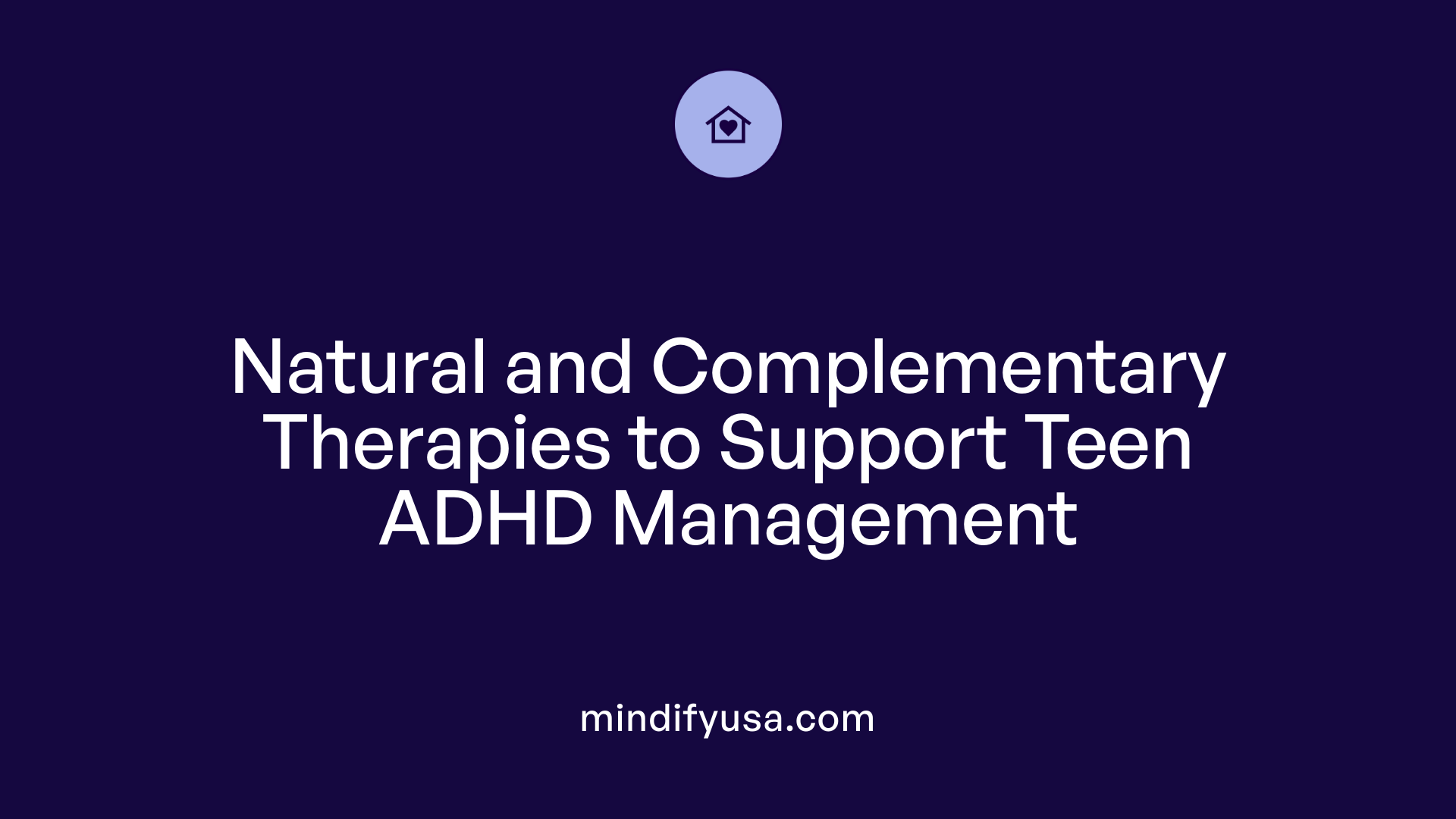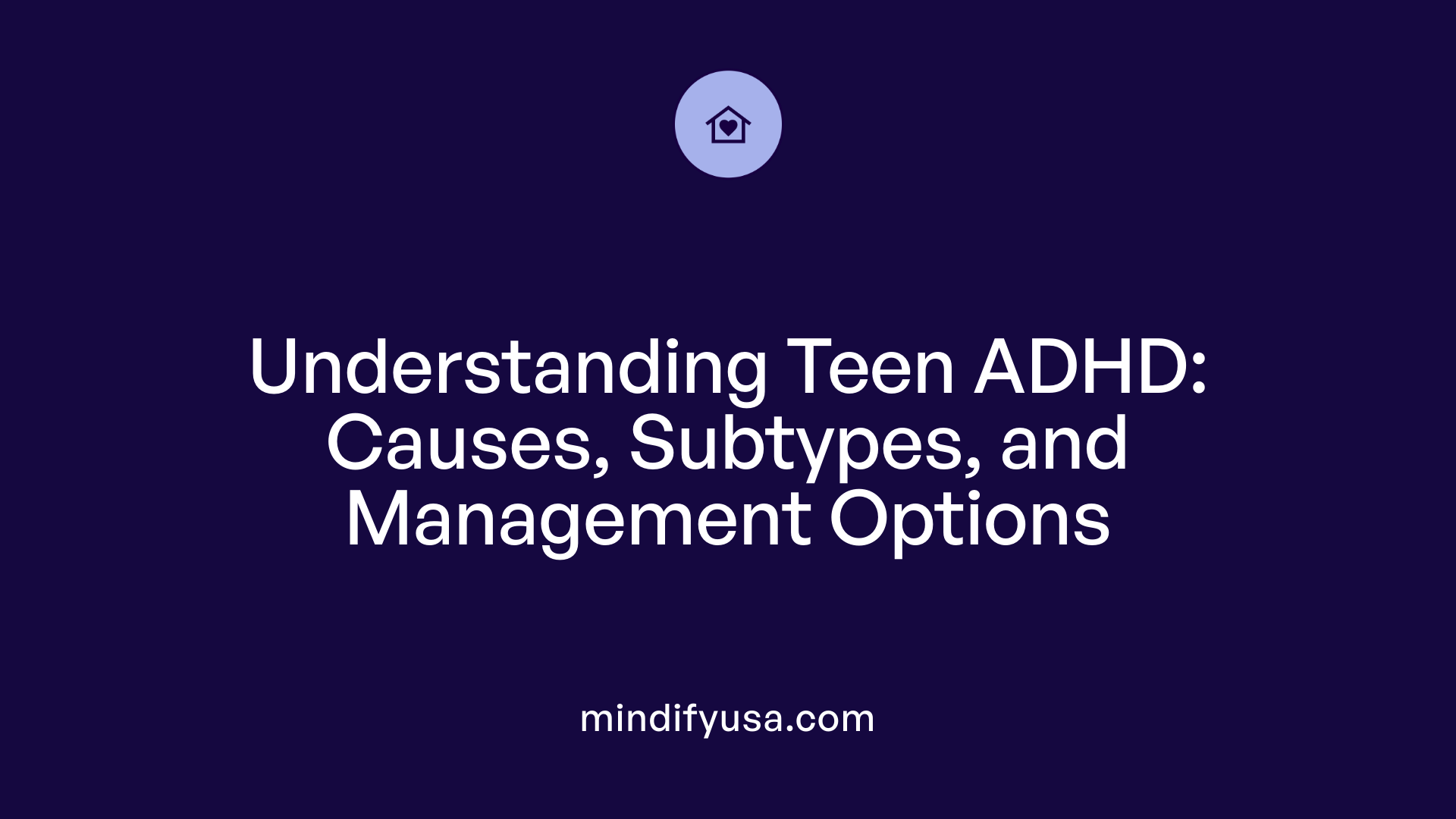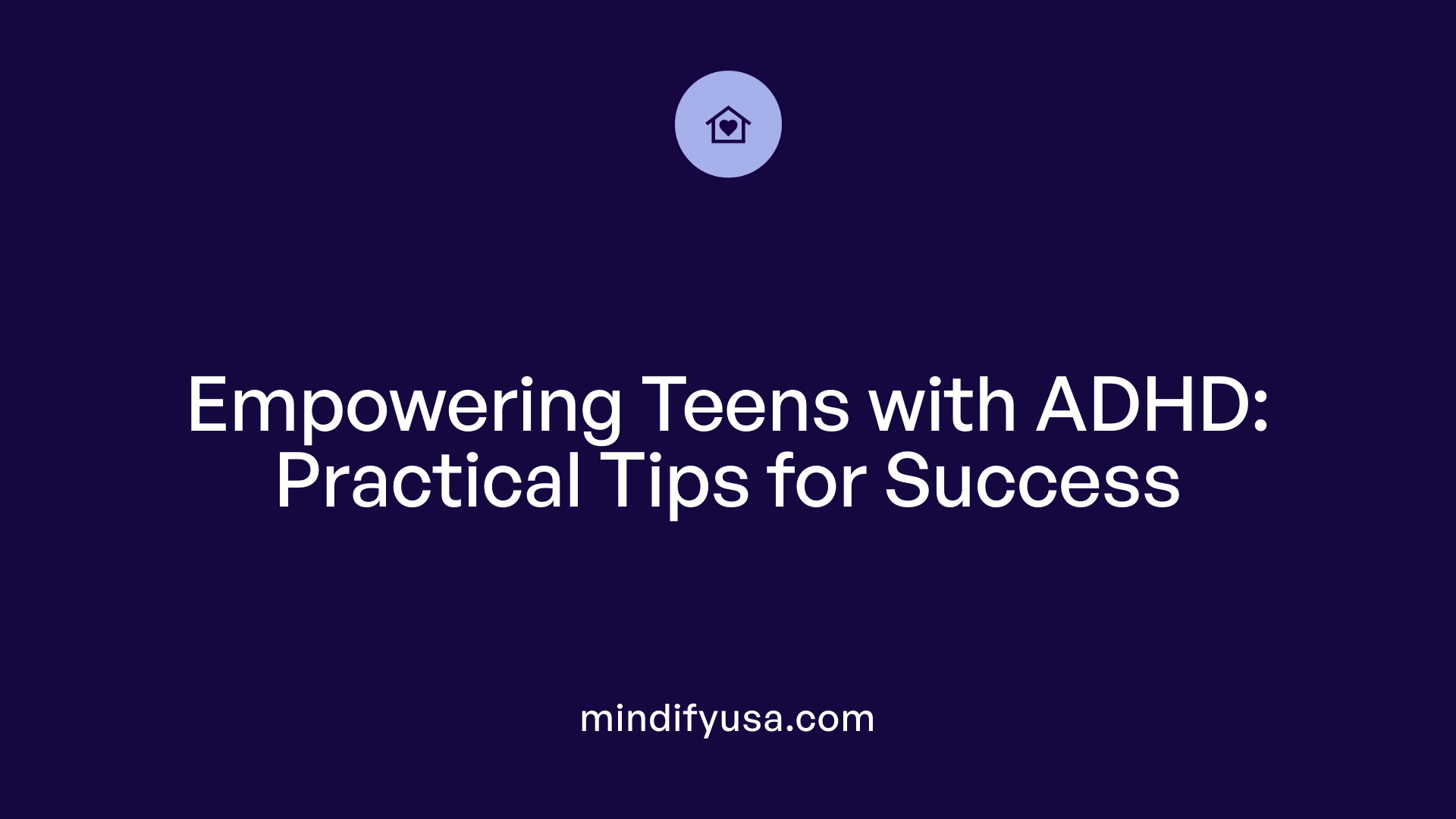Understanding Non-Medication Strategies for Teens with ADHD
Managing ADHD in teens without relying on stimulant medications involves a comprehensive approach that integrates behavioral interventions, lifestyle modifications, and natural therapies. This article explores evidence-based, safe, and effective strategies that empower parents, educators, and teens to optimize functioning and well-being through non-pharmacological means.
Evidence-Based Non-Stimulant Medications
For teens with ADHD, several non-stimulant medications have been backed by research as effective treatment options. Among these, atomoxetine (Strattera) is FDA-approved and widely used. It functions as a selective norepinephrine reuptake inhibitor and is particularly helpful for managing core symptoms like inattention and impulsivity. Because it does not have the same dependency risks as stimulants, it is often chosen when there are concerns about dependence or when comorbid anxiety exists.
Another non-stimulant option includes viloxazine (Qelbree). This newer medication modulates brain chemicals and can improve attention and reduce hyperactivity. It is generally well tolerated but may take several weeks before full benefits are observed.
Guanfacine (Intuniv) and clonidine (Kapvay) are alpha-adrenergic agonists initially developed for hypertension but now commonly prescribed for ADHD symptoms. These medications tend to decrease hyperactivity, impulsivity, and can help improve sleep quality. They are often used alone or alongside other treatments to enhance overall symptom control.
Side Effects and Considerations
While effective, these medications come with possible side effects. Common issues include drowsiness, fatigue, or blood pressure fluctuations. Decreased appetite is also a concern, which can affect growth in some children and teens. Because of these potential effects, close monitoring by healthcare providers is essential to adjust dosages and ensure safety.
A Holistic Approach
Medication alone often isn’t enough. Combining pharmacological treatment with behavioral therapy, lifestyle modifications like increased physical activity and good sleep hygiene, and educational support offers the best outcomes. Regular follow-ups help tailor the treatment plan, balancing benefits and side effects.
In summary, non-stimulant medications provide important options for teens with ADHD who may not tolerate stimulants well or have specific health considerations. Healthcare providers evaluate each teen’s unique needs to craft an effective, individualized treatment approach.
Behavioral Interventions and Lifestyle Modifications
What behavioral interventions and lifestyle modifications can help manage teen ADHD?
Managing ADHD in teenagers often involves a combination of behavioral strategies and lifestyle changes that support better focus, organization, and emotional regulation.
One of the most effective approaches is behavioral therapy, particularly cognitive-behavioral therapy (CBT), which helps teens develop coping skills and manage symptoms actively. CBT often focuses on improving organizational skills, reducing impulsivity, and enhancing emotional regulation.
Parent training plays a crucial role in supporting teens with ADHD. Parents learn techniques such as establishing consistent daily routines, providing clear instructions, using reward systems to encourage positive behavior, and managing distractions effectively. These strategies promote a stable environment that fosters self-control and independence.
School-based programs are also vital. Teachers trained in classroom management can implement behavioral interventions like preferential seating, minimizing distractions, and providing academic accommodations such as extended test times. Organizing routines, using visual schedules, and reinforcing positive behaviors can further boost academic success.
In addition to behavioral interventions, lifestyle modifications contribute significantly to symptom management. Maintaining a structured daily routine helps teens know what to expect, reducing anxiety and impulsivity.
Regular physical activity is especially beneficial. Exercise helps improve attention, regulate mood, and reduce hyperactivity. Incorporating at least an hour of daily physical activity, such as sports or brisk walking, can make a notable difference.
A balanced diet rich in fruits, vegetables, and lean proteins supports overall attention and mood stability. Limiting refined sugars and ultra-processed foods helps prevent mood swings and hyperactivity.
Adequate sleep is critical—sufficient sleep improves attention and emotional well-being. Establishing consistent sleep routines, limiting screen time before bed, and creating a calm sleeping environment help achieve better sleep quality.
Reducing screen time, especially in the evening, minimizes distractions and supports better sleep hygiene. Encouraging outdoor activities and mindfulness practices like meditation can further enhance focus and emotional control.
Overall, a holistic approach that combines behavioral strategies with healthy lifestyle habits can empower teens to better manage their ADHD symptoms, leading to improved academic performance and social interactions.
Natural and Complementary Therapies

Are there natural, complementary, or non-pharmacological therapies effective for teen ADHD?
Yes, several approaches beyond medication can support teens with ADHD. Behavior therapy is central, helping teens develop better organization, focus, and emotional regulation skills. This therapy emphasizes teaching positive behaviors and reinforcing good habits.
Physical activity is another vital support. Regular exercise, especially at least an hour each day, can enhance attention, improve mood, and strengthen executive functions like planning and impulse control. Activities like sports, dancing, or walking are excellent options.
Diet and nutrition also influence symptoms. Eating a balanced diet rich in protein, fruits, vegetables, and omega-3 fatty acids can support brain health. Reducing sugary foods, refined carbohydrates, and artificial additives may help lessen hyperactivity and improve focus.
Good sleep hygiene is crucial. Maintaining consistent bedtimes, limiting screens before sleep, and creating a calm bedtime routine can improve sleep quality. Better sleep leads to better attention and mood during the day.
Some herbal remedies, including Bacopa, Ginseng, and Pycnogenol, have shown promising results in small studies. However, their use should be supervised by healthcare providers due to limited research and potential interactions.
Emerging therapies like neurofeedback, which trains individuals to regulate brain activity, and various digital interventions, including cognitive training programs, are also gaining interest. These tools aim to improve attention and reduce impulsivity through technology-based methods.
Overall, combining these natural and supportive therapies with traditional treatments can offer a comprehensive way to manage teen ADHD effectively.
Early Intervention and Supportive Strategies

What early intervention strategies and supportive approaches are available for teens with ADHD?
Early intervention for teens with ADHD involves a combination of behavioral, educational, and lifestyle strategies designed to improve functioning and reduce symptoms. One of the main approaches is behavioral therapy, which often includes parent-teen training programs that help families develop effective communication and behavioral management skills. These programs focus on reinforcing positive behaviors, establishing routines, and improving self-regulation skills.
In the school environment, classroom management techniques, behavioral supports, and peer involvement strategies can make a significant difference. Teachers and school counselors may implement tailored interventions, such as seating arrangements that minimize distractions, use of visual aids, and structured routines to enhance focus and behavior.
Supporting teens also involves organizational coaching, which helps improve time management, planning, and organizational skills—areas often challenging for adolescents with ADHD. These coaches guide teens in using planners, digital reminders, and other tools to stay on top of assignments and responsibilities.
Combining these psychosocial strategies with appropriate medical treatment—such as medication when prescribed—can create a comprehensive support system. Additionally, physical exercise programs, especially those focused on aerobic activity, have been shown to promote neurocognitive development. Regular physical activity helps teens improve attention, regulate mood, and ignore distractions.
Cognitive training programs are also gaining popularity. These are designed to enhance working memory, processing speed, and other cognitive functions linked to executive control. Personalized training can support brain development and help address some of the core challenges of ADHD.
Overall, early intervention strategies and supportive measures are tailored to each teen’s developmental stage and needs. When combined, behavioral therapy, school-based supports, organizational coaching, physical activity, and cognitive training can foster better self-control, academic success, and social skills, setting a foundation for improved long-term outcomes.
Safe, Non-Pharmacological Strategies for Symptom Management

What are some safe and effective non-medication strategies for addressing teen ADHD symptoms?
Managing ADHD in teens often involves a combination of approaches that avoid medication but are still effective. Establishing consistent routines is fundamental. This includes regular sleep schedules, meal times, and dedicated study periods, which help create a predictable environment that supports focus and reduces anxiety.
Physical activity and outdoor activities play a crucial role. Engaging in daily exercise, such as aerobic activities, sports, or even active play, can boost mood, improve attention, and help teens release excess energy. These activities directly contribute to better focus and overall well-being.
Mindfulness and meditation practices are beneficial tools. Techniques like deep breathing exercises, yoga, and mindfulness meditation can improve emotional regulation, reduce hyperactivity, and promote mental calmness. Regular practice helps teens develop better control over their impulses.
Organizational tools are essential for managing daily responsibilities. Visual aids such as color-coded calendars, sticky notes, and digital reminders can help teens stay organized and remember important tasks and deadlines. These tools support executive functioning and reduce forgetfulness.
Behavioral techniques that reinforce positive behaviors are highly effective. Implementing reward systems, praising effort, and providing clear instructions help in guiding behavior healthily. Active support from parents and teachers through positive reinforcement encourages skill development and consistency.
Support from parents and teachers is vital. Parent skills training programs like the Positive Parenting Program (Triple P) and classroom interventions tailored to the child's needs can significantly improve behavior and academic performance. When caregivers and educators work together, teens receive a consistent message and better support.
These strategies offer a safe, non-invasive, and evidence-based approach to managing ADHD symptoms. They can be tailored to individual needs and used alongside other treatments to promote a balanced, effective management plan for teens.
Understanding Causes, Subtypes, and Management Strategies

What are the causes, subtypes, and management strategies of teen ADHD without stimulant medication?
ADHD in teenagers is primarily linked to differences in brain structure and function. These neurological variations can lead to increased distractibility, difficulty organizing tasks, and challenges with sustained attention. Teenagers with ADHD often display different subtypes, including predominantly inattentive, predominantly hyperactive-impulsive, or combined presentations. Recognizing these variations helps tailor treatment plans.
Managing ADHD without stimulant medications involves a variety of behavioral and lifestyle approaches. Behavior management strategies include parent training, classroom interventions, and peer support, all aimed at strengthening positive behaviors and reducing problematic ones. These methods might involve creating structured routines, using visual aids like color-coded calendars, and implementing reward systems to motivate progress.
Lifestyle modifications support overall well-being and symptom control. Maintaining a balanced diet rich in fruits, vegetables, and omega-3 fatty acids, while limiting processed foods and sugar, can improve attention. Adequate sleep, achieved through consistent routines and reducing screen time before bed, plays a critical role in reducing irritability and enhancing focus.
In addition, increasing physical activity helps teens burn excess energy, improve mood, and sharpen concentration. Interventions like organizational skills training and psychosocial therapies, such as cognitive-behavioral therapy, have shown promise. These approaches help teens develop coping mechanisms, improve emotional regulation, and build social skills.
Effective management in teens often involves an individualized approach, combining environmental adjustments and stress reduction techniques. Routine health monitoring ensures adjustment of strategies as needed. Addressing nutritional deficiencies like iron and zinc or sleep disturbances can further enhance treatment outcomes.
Research underlines the importance of combining behavioral strategies, lifestyle changes, and psychosocial interventions, all tailored to the teen's specific needs. This comprehensive approach can significantly improve functioning and quality of life, often without the need for stimulant medications.
Practical Tips and Educational Strategies for Teens and Caregivers

What educational tips and practical advice can help teens manage ADHD through behavioral and lifestyle changes?
Managing ADHD effectively involves a combination of behavioral strategies and lifestyle adjustments. For teens, establishing consistent routines—such as fixed times for waking up, meals, homework, and bedtime—provides stability and reduces anxiety caused by unpredictability.
Organizational tools are vital. Using planners, digital reminders, color-coded calendars, or sticky notes can help teens keep track of assignments, appointments, and responsibilities, making daily tasks more manageable.
Teaching behavioral skills like problem-solving, time management, and organization builds independence and confidence. For example, breaking tasks into smaller steps and using checklists can make complex activities less intimidating.
Support from educators and parents plays a critical role. Classroom accommodations, such as seating at the front to minimize distractions, turning off devices during study time, and offering extra time for tests, can significantly improve focus and performance.
Positive reinforcement strategies—like rewarding progress with praise or small rewards—encourage continued effort and foster positive habits. Parental involvement, including consistent communication and encouragement, supports teens in applying these strategies.
Collaborating with teachers, therapists, and healthcare professionals helps create a tailored support plan. When everyone works together, teens benefit from a cohesive environment that promotes learning, behavior management, and emotional well-being.
Incorporating these practical tips and educational strategies can empower teens with ADHD to succeed academically and socially while building lasting skills for independence.
Supporting Teens with ADHD Without Medication
A holistic, non-medication approach to managing teen ADHD emphasizes behavioral strategies, lifestyle modifications, and supportive environmental changes. Combining evidence-based therapies like behavioral and organizational training, regular physical activity, healthy diet, adequate sleep, mindfulness, and early intervention support can significantly improve attention, emotional regulation, and social functioning. Engaging teens in their treatment plans and fostering a supportive network comprising parents, teachers, and healthcare providers paves the way for success without the risks associated with stimulant medications. Empowering teens with practical skills, routines, and coping techniques enables them to thrive academically, socially, and emotionally, leading to improved quality of life.
References
- Easing ADHD without meds
- Non-prescription interventions for attention deficit hyperactivity ...
- Treatment of ADHD | Attention-Deficit / Hyperactivity ...
- Managing ADHD Symptoms Without Medication
- ADHD: Tips to Try (for Teens)
- Non-pharmacologic management of attention-deficit ...
- Can ADHD Be Effectively Treated Without Medication?





































































































